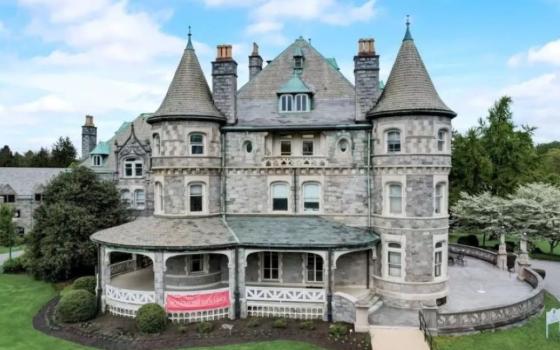
Retired Pope Benedict XVI greets Pope Francis at the conclusion of a consistory at which Pope Francis created 19 new cardinals in St. Peter's Basilica at the Vatican Feb. 22. (CNS photo/Paul Haring)
Pope Francis on Saturday called on the world’s Catholic cardinals to be compassionate peacemakers among people experiencing violence and exclusion while adding 19 new members to their ranks in a ceremony unexpectedly attended by retired Pope Benedict XVI.
The appearance by the retired pontiff -- his first significant public viewing since his resignation almost one year ago sparked Francis’ election -- shocked most in the overflow crowd at St. Peter’s Basilica. Many applauded loudly as Benedict entered the church, walking slowly with aid of a cane.
At the start of the ceremony, known as a consistory, Francis greeted his predecessor first, embracing him in a hug. Benedict, in what may have been a sign of obedience to Francis, removed his white skullcap, known as a zucchetto, during the greeting.
Like the embrace of the first two living popes in some 600 years, Saturday’s ceremony was marked by signs both new and old.
While full of traditional pomp -- each of the cardinals wore red choir robes and received golden rings -- Francis told the most select group of Catholic prelates that among their responsibilities is expressing compassion and building peace.
In short remarks following a Gospel reading, Francis directed a set of things he said the church would require from them in their new role, stating frankly: “I will tell you what the church needs.”
“The church has need for your compassion, especially at this time of pain and suffering for so many countries around the world,” Francis said.
“The church needs us also to be peacemakers, building peace by our own works, our hopes and our prayers: let us therefore invoke peace and reconciliation for those peoples presently experiencing violence, exclusion and war,” he said.
Concluding his remarks, Francis called on the cardinals to “walk together behind the Lord” and “always be called together by him, in the midst of his faithful people -- the holy people of God-- to holy mother the church.”
While Francis spoke mainly from his prepared text for the remarks, he added the phrase “the holy people of God” extemporaneously. Likewise, when referring to those experiencing violence, he added the word “exclusion,” which was not in the prepared text.
Saturday’s ceremony was for the formal induction of 19 new prelates into the College of Cardinals, the select group who are responsible for electing a pope when the current pontiff dies or resigns. Francis announced his choices for the honor last January, choosing prelates who hail mainly from places in the Global South, like Haiti, Burkina Faso, and the Philippines.
18 of the 19 selected were present for the ceremony, at which Francis gave the new cardinals a special ring and red hat, known as a biretta. Cardinal Loris Capovilla, the oldest prelate ever to be inducted into the college at age 98, was unable to attend the ceremony.
The formal event also includes a public profession of faith from each of the new cardinals and an oath of fidelity to be “constantly obedient” to the Gospel, to the Catholic church, and “to Blessed Peter in the person of the Supreme Pontiff,” specified during the ceremony as Pope Francis.
In an error some may see as particularly awkward given the retired pope’s presence at the ceremony, a working document given to journalists to explain the event rendered the oath of the fidelity of the cardinals to Benedict, and not Francis.
When making the oath, the cardinals also pledge “not to make known to anyone matters entrusted to me in confidence, the disclosure of which could bring damage or dishonor to Holy Church.”
The Vatican’s secretary of state, Cardinal Pietro Parolin, began the ceremony Saturday by greeting Francis in the name of the some 185 cardinals present. Parolin, who was made a cardinal during the event, also thanked Benedict for his presence.
Benedict waved and smiled at his mention. The retired pontiff, seated in the front row of the cardinals near the Baldacchino, or high altar, of St. Peter’s, wore a white overcoat over a white cassock.
Parolin is one of only four of the new cardinals chosen by Francis to come from the Vatican’s central bureaucracy, known as the Roman curia.
Ten of Francis' choices come from places outside Europe, including some of which have never had a cardinal.
Among those made cardinal Saturday: Jean-Pierre Kutwa, Archbishop of Abidjan, Ivory Coast; Andrew Yeom Soo jung, Archbishop of Seoul, Korea; Philippe Ouédraogo, Archbishop of Ouagadougou, Burkina Faso; Chibly Langlois, Bishop of Les Cayes, Haiti; Orlando Quevedo, Archbishop of Cotabato, Philippines.
Francis also mentioned Christians suffering discrimination and persecution in his remarks Saturday, telling the cardinals the church “has need of our prayer for them, that they may be firm in faith and capable of responding to evil with good.”
“And this prayer of ours extends to every man and woman suffering injustice on account of their religious convictions,” the pope continued.
The cardinals’ role in electing the pope is traced to the fact that upon their entrance to the College of Cardinals they are each assigned a separate church in Rome to symbolically lead as pastor. From those posts they are considered the clergy of the city, who then elect their bishop, the pope.
During the ceremony Saturday, Francis announced which churches in Rome each of the cardinals would symbolically shepherd.
In what is perhaps a subtle sign of favor, Francis said Capovilla would pastor Santa Maria in Trastevere, one of Rome’s oldest churches and which claims to be the first church dedicated to the Virgin Mary.
Capovilla was the priest secretary of Blessed Pope John XXIII, who called the 1962-65 worldwide meeting of bishops known as the Second Vatican Council.
[Joshua J. McElwee is NCR national correspondent. His email address is jmcelwee@ncronline.org. Follow him on Twitter: @joshjmac.]




